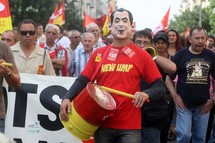
Only eight percent of French workers were unionised in 2008, compared to 19 percent in Germany and 27 percent in Britain, according to the Organisation for Economic Cooperation and Development.
While workers in the public sector -- such as transport and energy -- are relatively unionised, "numerous private sectors, such as services and business, are union deserts," said academic analyst Dominique Andolfatto.
And while France has a reputation for strikes, its number of strike days is actually around the European average.
Guy Groux of the National Centre for Scientific Research (CNRS) explains this gap between perception and reality as being down to France having "strikes in high-visibility sectors such as transport or education."
The relatively low number of union members stems from historical ideological divisions, with eight unions sharing less than two million members. In Germany, the DGB union federation has seven million members.
And, while in a country like Belgium union membership is a must if you want to have access to unemployment benefits, this is not the case in France.
France has only a third of the union members it had in 1975, a drop attributed to de-industrialisation, a fracturing of the workforce between smaller firms and sub-contractors and fewer so-called "jobs for life".
A similar drop in civil servant union membership is down to the Socialist Party coming to power in 1981 which "put the unions to sleep" during the period when government was run by their ideological allies, says Groux of the CNRS.
Researchers say that a fall in union numbers is the result of union leaders becoming more professionalised, and spending more time in obscure negotiations with management than with workers, who feel less represented.
As a result, union members are getting older. At the CFDT, the average member's age is 50. "We're heading for retiree unionism," says Groux.
Many young workers feel that unions are too politicised, he says, despite the fact that the CGT, for instance, is no longer the vehicle of the Communist Party and is slowly reforming itself on less ideological lines.
And a significant proportion of the political right as well as employers themselves, especially in small businesses, are hostile to the unions' very existence.
Fear of reprisals from management is cited as the top reason for not being a union member, despite this right being protected by law.
Furthermore, the arrival of a culture of negotiation in France, where unions have historically sought to flex their muscles on the street before even beginning talks, is relatively recent, says the CFDT's Garnier.
Unions complain, for instance, that the current pension reform is a step backwards to the days before negotiation, as they say it is being pushed through parliament without any consultation.
Mass strikes such as Tuesday's also have a historical precedent, and have worked in the past.
Two right-wing prime ministers, Alain Juppe in 1995 and Dominique de Villepin in 2006, have had to back down on their reform plans in the face of mass protests.
----------------------------------------------------------------------------------
While workers in the public sector -- such as transport and energy -- are relatively unionised, "numerous private sectors, such as services and business, are union deserts," said academic analyst Dominique Andolfatto.
And while France has a reputation for strikes, its number of strike days is actually around the European average.
Guy Groux of the National Centre for Scientific Research (CNRS) explains this gap between perception and reality as being down to France having "strikes in high-visibility sectors such as transport or education."
The relatively low number of union members stems from historical ideological divisions, with eight unions sharing less than two million members. In Germany, the DGB union federation has seven million members.
And, while in a country like Belgium union membership is a must if you want to have access to unemployment benefits, this is not the case in France.
France has only a third of the union members it had in 1975, a drop attributed to de-industrialisation, a fracturing of the workforce between smaller firms and sub-contractors and fewer so-called "jobs for life".
A similar drop in civil servant union membership is down to the Socialist Party coming to power in 1981 which "put the unions to sleep" during the period when government was run by their ideological allies, says Groux of the CNRS.
Researchers say that a fall in union numbers is the result of union leaders becoming more professionalised, and spending more time in obscure negotiations with management than with workers, who feel less represented.
As a result, union members are getting older. At the CFDT, the average member's age is 50. "We're heading for retiree unionism," says Groux.
Many young workers feel that unions are too politicised, he says, despite the fact that the CGT, for instance, is no longer the vehicle of the Communist Party and is slowly reforming itself on less ideological lines.
And a significant proportion of the political right as well as employers themselves, especially in small businesses, are hostile to the unions' very existence.
Fear of reprisals from management is cited as the top reason for not being a union member, despite this right being protected by law.
Furthermore, the arrival of a culture of negotiation in France, where unions have historically sought to flex their muscles on the street before even beginning talks, is relatively recent, says the CFDT's Garnier.
Unions complain, for instance, that the current pension reform is a step backwards to the days before negotiation, as they say it is being pushed through parliament without any consultation.
Mass strikes such as Tuesday's also have a historical precedent, and have worked in the past.
Two right-wing prime ministers, Alain Juppe in 1995 and Dominique de Villepin in 2006, have had to back down on their reform plans in the face of mass protests.
----------------------------------------------------------------------------------









 Home
Home Politics
Politics









